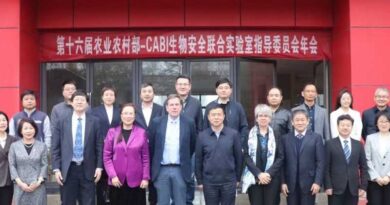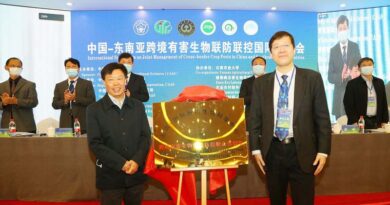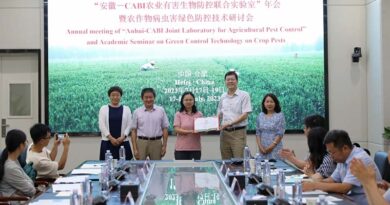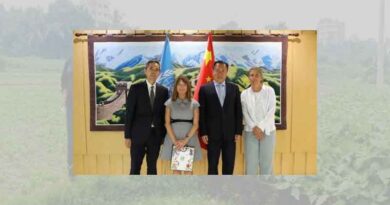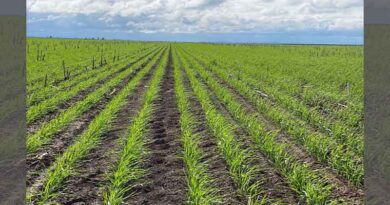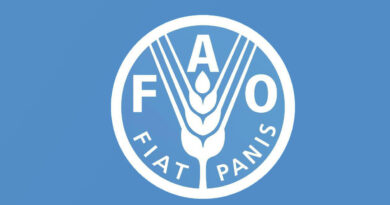MARA-CABI Joint Lab witnessed ‘outstanding progress’ in 2021 despite COVID-19 pandemic
28 March 2022, China: The Chinese Ministry of Agriculture and Rural Affairs (MARA)-CABI Joint Laboratory for Biosafety (Joint Lab) has reported ‘outstanding progress’ in all aspects of its business throughout 2021 despite challenges posed by the prolonged COVID-19 pandemic.
The Joint Lab – which was launched in 2008 by MARA and CABI, and is widely regarded as one of the top platforms of its type within the Chinese agricultural research and development community – is performing exceptionally in terms of its governance, management, scientific exchanges and research, and development co-operations.
The 14th annual Steering Committee meeting of the Joint Lab heard that the implementation of on-going collaborative projects and development of new international projects, as well as capacity building and awareness-raising, are also areas in which the facility is excelling.
Last year saw 11 new proposals or concept notes jointly developed with international and/or Chinese partners, seven of which were approved for funding worth USD $1.14m. Based on previous Newton Funds project partnership, remote sensing monitoring and early warning of major crop diseases and insect pests globally was successfully funded by the Chinese Ministry of Science and Technology (MOST).
The approved projects include the development of a regional fall armyworm (FAW) biocontrol programme for the Association of Southeast Asian Nations (ASEAN) Action Plan to help countries in the region respond to, monitor and manage this crop pest.
Other projects that were awarded funding are those focused on the integrated management of major transboundary agricultural pests and the remote sensing, monitoring and early warning of major crop diseases and insect pests globally – both of which are also funded by MOST.
The year 2021 in review for the Joint Lab also learnt that the project ‘Establishment and application of intelligent plant protection technology system in urban agriculture’ – based upon the CABI-led Plantwise programme’s plant clinic work in Beijing – was awarded the third Prize of the Shen Nong China Agricultural S&T Award, sponsored by MARA.
Looking forward, the Joint Lab is ready to embrace new opportunities and challenges in 2022 – particularly through continued research on transboundary crop pest prevention and control, the Belt and Road Plant Protection initiative, PlantwisePlus implementation, and the European Lab programme.
PlantwisePlus – based on the achievements of 10 years of Plantwise implementation in China has continued to facilitate plant clinic networks further embedded into local government’s priorities in Beijing area and Sichuan province.
Status quo and case studies in PlantwisePlus relevant fields have been fully launched to identify the synergies between PlantwisePlus activities and Green Agriculture Development in China.
Furthermore, 2021 saw the training of 119 new plant doctors able to help farmers diagnose and mitigate their plant health problems. The issuance of nearly 73,000 prescription sheets detailing the issues and advise given were also completed over the course of the year.
Regarding the Belt and Road Plant Protection International Cooperation, the Joint Lab continued to play a bridging role in some of China’s initiatives such as ‘Chinese Technology Going Global’ and ‘the Belt and Road’ initiatives, and made contributions to the Centre for International Agricultural Research (CIAR) of the Chinese Academy of Agricultural Sciences (CAAS) programmes. This included assisting in publishing a policy brief on ‘Empowering smallholder farmers to access digital agricultural extension and advisory services.’
The Steering Committee meeting started with three opening remarks from MARA, CAAs and CABI, respectively.
The Chair of the Joint Lab Steering Committee for 2021, Mr Peng Tingjun (DDG, Department of International Co-operations, MARA and CABI’s Executive Council member) highlighted some policy and funding opportunities for the Joint Labs to play more important roles. “At the beginning of 2022, MARA issued the 14th Five-Year Plan for International Cooperation in Agriculture and Rural Affairs, which particularly emphasized the need to strengthen co-operation with international organizations and key countries in basic research as well as frontier interdisciplinary research. The prospects for deepening collaboration between China and CABI through the Joint Lab platform therefore look very promising,” said Mr Peng.
Dr Sun Tan, Vice President of the Chinese Academy of Agricultural Sciences, which hosts the Joint Lab in Beijing, also suggested that the Joint Labs should continue to develop synergies with some important initiatives of China’s, for example, Monitoring and Control of Major Transboundary Diseases and Pests under CAAS’ International Agricultural Science Program. “As an important international partner in this project, CABI, through the Joint Lab framework, will be in a good position to promote high-quality implementation and attract participation of more CABI member countries as the project continues to advance in depth,” said Dr Sun.
Dr Ulli Kuhlmann, Executive Director, Global Operations at CABI and Co-Director of the Joint Lab, said, “The Joint Lab made outstanding progress throughout 2021 despite very challenging circumstances exacerbated by the ongoing COVID-19 pandemic.
“Nevertheless, in strong partnership our collaborations are yielding positive societal and ecological benefits to stakeholders in terms of south-south cooperation and technology transfer in research into the monitoring, remote sensing and mitigation of Invasive Alien Species as part of an Integrated Pest Management strategy.”
The 14th annual meeting of the Joint Lab also took the opportunity to review the work of the MARA-CABI European Laboratory – based at CABI’s Swiss centre in Delémont – in 2021 as well as collaborative research projects to be undertaken throughout 2022. This will include further studies on the biological control of FAW.
The Joint Lab’s outputs also included 30 scientific papers published in peer-reviewed journals. Twelve oral presentations and a poster was also delivered at international and Chinese conferences.



